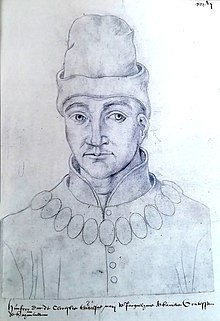
Back همفري لانكاستر (دوق غلوستر الأول) Arabic همفرى لانكاستر ARZ Humphrey z Gloucesteru Czech Humphrey o Gaerhir, Dug Caerloyw 1af Welsh Humphrey, Duke of Gloucester German Χάμφρεϊ, δούκας του Γκλόστερ Greek Humphrey, duko de Gloucester Esperanto Hunfredo de Gloucester Spanish همفری، دوک گلاستر Persian Humphrey de Lancastre French
A request that this article title be changed to Humphrey of Lancaster is under discussion. Please do not move this article until the discussion is closed. |
| Humphrey of Lancaster | |
|---|---|
| Duke of Gloucester | |
 c. 16th-century drawing based on contemporary portrait (from the Recueil d'Arras) | |
| Born | 3 October 1390 |
| Died | 23 February 1447 (aged 56) Bury St Edmunds, Suffolk |
| Burial | 4 March 1447 |
| Spouse | Jacqueline of Hainaut (m. 1422, ann. 1428) Eleanor Cobham (m. 1428–1431, ann. c. 1441) |
| Issue | Arthur of Gloucester (illegitimate); Antigone, Countess of Tankerville (illegitimate) |
| House | Lancaster |
| Father | Henry IV of England |
| Mother | Mary de Bohun |

Humphrey of Lancaster, Duke of Gloucester (3 October 1390 – 23 February 1447) was an English prince, soldier and literary patron.[1] He was (as he styled himself) "son, brother and uncle of kings", being the fourth and youngest son of Henry IV of England, the brother of Henry V, and the uncle of Henry VI. Gloucester fought in the Hundred Years' War and acted as Lord Protector of England during the minority of his nephew. A controversial figure, he has been characterised as reckless, unprincipled, and fractious, but is also noted for his intellectual activity and for being the first significant English patron of humanism,[2] in the context of the Renaissance.
Unlike his brothers, Humphrey was given no major military command by his father, instead receiving an intellectual upbringing. Created Duke of Gloucester in 1414, he participated in Henry V's campaigns during the Hundred Years' War in France: he fought at Agincourt in 1415 and at the conquest of Normandy in 1417–9. Following the king's death in 1422, Gloucester became one of the leading figures in the regency government of the infant Henry VI. He proved a rash, impulsive, unscrupulous and troublesome figure, he quarrelled constantly with his brother, John, Duke of Bedford and uncle, Cardinal Henry Beaufort and went so far as to violently prosecute a dispute with the Duke of Burgundy, a key English ally in France, over conflicting claims to lands in the Low Countries.
Humphrey was the exemplar of the romantic chivalric persona. Mettled and courageous, he was a foil for the countess Jacqueline of Hainaut, his first wife.[3] His learned, widely read, scholarly approach to the early renaissance cultural expansion demonstrated the quintessential well-rounded princely character. He was a paragon for Eton College and an exemplar for the University of Oxford, accomplished, diplomatic, with political cunning. Despite the errors in his public and private life and the mischief he caused in politics, Gloucester is also at times praised as a patron of learning and a benefactor to the University of Oxford. He was popular among the literary figures of his age for his scholarly activity and with the common people for his advocacy of a spirited foreign policy. For these causes, he was known as the "good Duke Humphrey".[4]
Gloucester never fully achieved his desired dominance in England, and his attempts to gain a foreign principality for himself were fruitless.[5] A staunch opponent of concessions in the French conflict and a proponent of offensive warfare, Gloucester gradually lost favour among the political community, and King Henry VI after the end of his minority, following defeats in France. The trial in 1441 of Eleanor Cobham, his second wife, under charges of witchcraft, destroyed Gloucester's political influence. In 1447, he was accused, probably falsely, of treason and died a few days later while under arrest.[4]
- ^ Harriss, G.L. (19 May 2011). "Humphrey, duke of Gloucester (1390–1447)". Oxford Dictionary of National Biography (online) (online ed.). Oxford University Press. doi:10.1093/ref:odnb/14155. (Subscription or UK public library membership required.)
- ^ Britannica (20 July 1998). "Humphrey Plantagenet, duke of Gloucester". Encyclopædia Britannica.
- ^ Burne, A. (31 January 2002). The Hundred Years' War. Classic Military History. Penguin Books. ISBN 978-0-14-139115-1. Burne's view has more recently been challenged in Mortimer 2009, pp. 31–33
- ^ a b Low & Pulling 1910, p. 506.
- ^ Low, S.; Pulling, F., eds. (1910). "Gloucester, Humphrey, Duke of". The Dictionary of English History. Cassell. p. 506